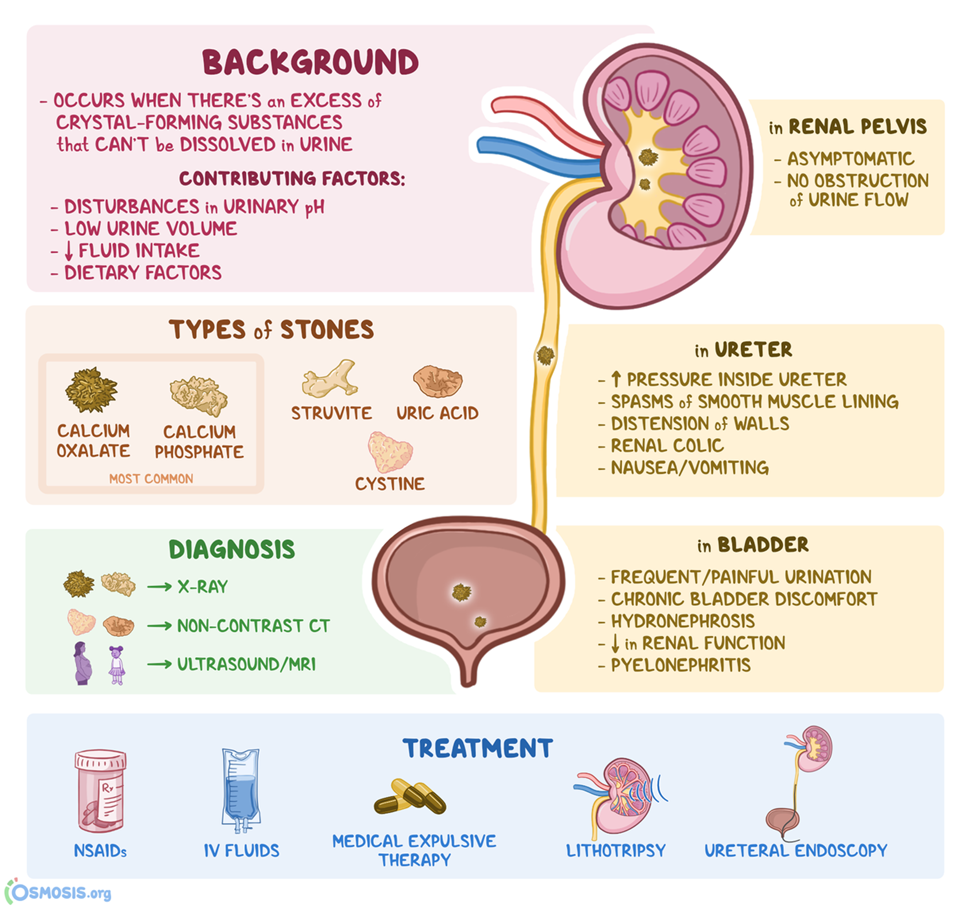A client with hyperparathyroidism reports a sudden onset of severe flank pain. Which intervention should the nurse include in the client's plan of care?
Initiate cardiac telemetry.
Administer a PRN dose of a laxative.
Implement seizure precautions
Begin straining all urine
The Correct Answer is D
A. Initiate cardiac telemetry:
Cardiac telemetry is not the immediate priority in this case. Kidney stones are more likely to cause severe localized pain rather than cardiac-related symptoms.
B. Administer a PRN dose of a laxative:
Laxatives are not indicated for the management of kidney stones or the associated flank pain. The priority is to address the specific needs related to the possible passage of kidney stones.
C. Implement seizure precautions:
Seizure precautions are not relevant to the sudden onset of severe flank pain in the context of hyperparathyroidism. The focus should be on managing pain, assessing for kidney stone passage, and addressing the underlying cause.
D. Begin straining all urine.
Straining all urine allows for the collection and examination of any passed stones. This information is important for identifying the composition of the stones and guiding further management.

Nursing Test Bank
Naxlex Comprehensive Predictor Exams
Related Questions
Correct Answer is ["B","C","D"]
Explanation
A. Skin elasticity:
Assessing skin elasticity is a measure of hydration status. Improved skin turgor may suggest that the client is responding positively to diuretic therapy by eliminating excess fluid. However, this may not be as immediate or specific as other indicators of response.
B. Urinary output:
Monitoring urinary output is crucial when administering diuretics like furosemide. Increased urine output indicates that the diuretic is promoting the elimination of excess fluid from the body, which is a desired effect in managing heart failure and fluid overload.
C. Oxygen saturation:
Assessing oxygen saturation is important in monitoring respiratory status. Improvement in oxygen saturation levels indicates that the client is responding to interventions aimed at relieving respiratory distress, such as the administration of furosemide.
D. Lung sounds:
Monitoring lung sounds is a key aspect of assessing respiratory function. Reduction in wheezes and crackles suggests that the diuretic is helping to alleviate pulmonary congestion and fluid accumulation in the lungs, contributing to improved respiratory function.
E. Pain scale:
Assessing pain is relevant if the client has reported chest pain or discomfort associated with heart failure. Reduction in pain may indicate improved cardiac function and response to treatment. However, it's important to note that pain assessment may not be as specific to the effects of furosemide as other respiratory and fluid status indicators.
Correct Answer is D
Explanation
A. Remind the client to practice pelvic floor (Kegel) exercises regularly.
Pelvic floor exercises, such as Kegel exercises, are typically recommended for conditions involving weakened pelvic floor muscles. However, in the context of urinary retention related to sensorimotor deficits in multiple sclerosis, the issue is more neurological in nature. Therefore, pelvic floor exercises may not address the underlying problem effectively.
B. Provide a bedside commode for immediate use in the client's room.
While a bedside commode may be beneficial for individuals with mobility issues, it doesn't directly address the problem of urinary retention. It focuses on providing a convenient means for the client to void when needed, but it doesn't address the inability to empty the bladder spontaneously.
C. Explain the need to limit intake of oral fluids to reduce client discomfort.
Limiting oral fluids is not an appropriate intervention for urinary retention. In fact, it could lead to dehydration, which is not a recommended approach. The focus should be on addressing the difficulty in voiding through appropriate techniques.
D. Teach the client techniques for performing intermittent catheterization.
This is the correct choice. Intermittent catheterization is a direct and effective method to manage urinary retention in clients with sensorimotor deficits. Teaching the client how to perform intermittent catheterization empowers them to maintain regular bladder emptying and prevent complications associated with urinary retention.
Whether you are a student looking to ace your exams or a practicing nurse seeking to enhance your expertise , our nursing education contents will empower you with the confidence and competence to make a difference in the lives of patients and become a respected leader in the healthcare field.
Visit Naxlex, invest in your future and unlock endless possibilities with our unparalleled nursing education contents today
Report Wrong Answer on the Current Question
Do you disagree with the answer? If yes, what is your expected answer? Explain.
Kindly be descriptive with the issue you are facing.
